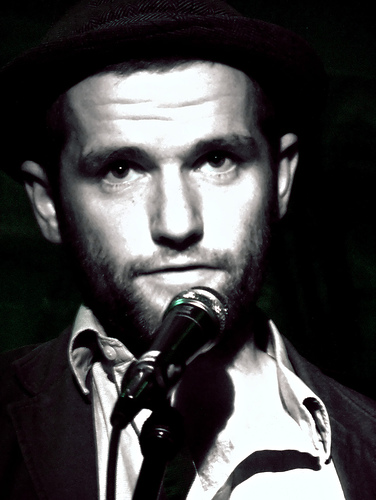On Monday I posted part 1 of my interview from last week with Immortal Technique. In it, he touched on his method of writing music and creating albums, his inspiration, his time in prison and his previous work with DJ Green Lantern. In part 2 of this interview, Tech talks more about his upcoming release The 3rd World (due out June 24th), capitalism, the foreign policies of the US and perception of Third World countries. Check back Friday for the third and final installment of this interview.
AC: It’s my understanding that the title of this album, The 3rd World, is also a metaphor that looks at the recording industry as being almost US Imperialistic-like, and the underground scene being more of a 3rd world country, is that correct?
IT: Absolutely. And even in the way we’re presented, they present the underground as some little backwards ass place where nothing really gets done, the same way they say, “the only way that some of these 3rd world countries can be efficient, the only way you dark people can have any sort of success is to privatize everything. Privatize your water, your communications, your transportation industries, sell us your diamonds, sell us the rights to your oil.” And that’s what the industry does when it comes in to deal with another artist. “In order for you to get on, what you have to do is change your image, take the political content out of your music, change the way we market you, sell us your masters, sell us your publishing, sign a 360 deal where we get a huge percentage of your merch and your fucking shows.” And I’ve always looked at that as utter ridiculousness, and I can’t accept stuff like that.
In the same way that that’s done to our people overseas, that’s done to us here. And we’re not any more efficient than anyone else. We think that because of the technological advances of our society that that makes us morally superior and more civilized than anybody else? America still has election fraud just like West Africa; we just had that in 2000. We still assassinate our own presidents; we just did that what, 35, 40 years ago? And after that, Bobby Kennedy? And we’ve had political assassinations after that. We have a high murder rate, we’re a gun culture, we’re no better than anybody else. We’ve definitely funded horribly authoritarian regimes, and then we sort of step away from that.
I look at the example of El Salvador, where we put 1.8 billion dollars a year into a Civil War to fund paramilitary death squads. And because we’re not physically on the ground doing it, we step away from that as if we had nothing to do with the repercussions of it and the horrible human rights abuses, the torture, rape and murder that even ended up claiming the life of an Archbishop of the Catholic church simply because he was telling the troops that were funded by American money and the CIA that it was un-Christian to oppress their own people. And it was un-Christian to commit political genocide against people who thought differently from them. And that it was the will of God and Jesus Christ to show mercy to the poor and to realize how corporations were exploiting people. That’s not Christian Socialism, fucking idiot, that’s Christianity, that’s the spirit of Jesus Christ.
If I come into a room and you’re having a debate with somebody, and I give you a set of kitchen knives, or I give you a gun, and I leave the room and I say, “Handle your business,” and lock the door behind me, just because I’m not in the same room as you when you do what you need to do, or when you do what I put you up to do so I can gain the benefit of you controlling that room economically, that doesn’t alleviate me from the moral responsibility of what has happened there. And I think that that’s something that the American empire will have to admit or it will destroy it in the long run, because truth crushed will always come to light. I’m afraid that Leo Strauss, father of Neoconservatism, was deathly wrong. It wasn’t that Liberalism failed. It was that America became schizophrenic, because on the one hand it claimed to be the bastion of freedom and democracy, and on the other hand, it was a racist police state for Black people and it was spreading its own brand of Imperialism to the rest of the world, just like Russia was. What Russia did to Eastern Europe and Asia was the same thing that America was doing to West African and all of Latin America and the Caribbean. So where’s our moral high ground? Didn’t we do deals with the Taliban before? You want to find excuses for all of this, that’s fine, but you’re just lying to yourself. These aren’t conspiracy theories, these are real life issues. We created the Saddam Husseins, we created Manuel Noriega, because we needed people like that.
AC: Now tying that back into the labels of the underground, what do you think the underground labels need to do, both separately and together, need to do in order to create the kind of backlash needed to change the current industry structure?
IT: Really just make music that has soul. Make music that you want to. I know that there is a trend to just make music that’s radio friendly, this one’s for the radio, this one’s for the bitches, quote unquote. I just make music and then after the album is done, I say to myself, “ok, what can I see playing on the radio? What is more for the streets?” Whereas other people tailor their music for this or that, or they’re like, “Oh, yo, this isn’t a really dope song, these aren’t really great lyrics, but this would probably make a really hot ringtone.” Like, at that point, what the fuck are you really doing?
AC: That leads me to an interesting question. Lately, I don’t know if you’ve been reading about it, but there’s been a few really well publicized stabs at independently releasing albums for free on the internet by Radiohead and Nine Inch Nails. Do you think those releases were an important step in the way the industry is changing, or does the fact that both of these groups were already well established and wealthy enough to release an album for free make it more of a publicity stunt than anything else?
IT: That’s an interesting argument. I mean, can you have Capitalism without capital? That’s essentially what the argument is. Could America have had an Industrial Revolution without the capital it built up from slavery? Probably not. The reason that we abolished slavery was not because we had some sort of guilty conscience. Even in the beginning of the 1900s, they kept African people in the Bronx Zoo as proof that they were the link between man and monkey. They used to keep Pygmy Africans there. I mean, this is reality. Racism was backed up by Eugenicists, by racial science, by the church even, in order to justify continuing the profit margins of slave traders and one subsection of the country. Whereas the other side realized, “You know what? It’s much more efficient for us to be able to have free men do their labor. They work much more efficiently than slaves, and we don’t have to pay for anything. They have to pay for their own things.” The money that they get is regenerated and recycled into the economy itself, it creates a stronger economy.
In the same respect, I have to say that that’s a beautiful concept, and if someone blew up just doing that and giving away their music for free, then obviously they had some other job, but I guess these cats have the benefit of already having a multi-million dollar success. But I wouldn’t necessarily categorize it as publicity stunt or something that was done with some sort of two-faced attempt at garnering even more of a fan base. I mean, it seems like they were just honestly putting their reputation to the test with their fans. They could have miserably failed, and it could have done nothing, and it could have been broke, but they gambled the right way. Obviously they have a very loyal fan base. It’s something that I guess, you’re right, can only be done with a fan base that’s committed to the artist.
AC: Now going off on fan bases, you tour and you make a point of spreading your music outside of the US. What have you seen as the state of record industries in other countries, and how has going abroad helped you spread your message and build your base?
IT: Well I can spit in English and Spanish, so definitely anytime I’m in front of a Latin American audience, or a Spanish speaking audience in Spain, we’ve been able to look at that and think to ourselves, or I think to myself, how far this hip-hop culture has actually come. In other ways though, I look at it and think that in Africa and Latin America, when I’ve been there, people don’t buy anything but bootleg albums. No one goes to the store to pay the equivalent of 10 dollars for a CD because that’s literally like a week’s wage.
AC: The word of mouth surrounding you obviously has been increasing greatly in the last few years, and you’ve done this all without the major labels’ help. For someone like you who was told that the marketing of your music would be difficult, and your content would be difficult to sell, how have you attacked self-marketing, and what has the growing success meant in terms of changing your strategy now?
IT: Lots of people, not just the record labels, told me that this wasn’t going to be lucrative or that no one was going to care, but I was fortunate enough to believe in myself and say, listen, I’m going to do whatever I want, with or without the express permission of other people. There’s no gatekeeper for me. I don’t need somebody to co-sign me to put me on.
Anyone who has supported me has never been because I twisted their arm, it’s been out of the goodness of their own heart because they felt the truth in the music. So I think in terms of marketing myself, I don’t need to create a rap persona, or a different personality in order to sell records. For me, it’s just as simple as getting the word out and getting the music to people. The music sells itself, and the message sells itself. It creates an even stronger support base because we’re drawing in from lots of people who don’t get their struggle talked about, lots of people who never really had the benefit of Hip-Hop addressing some of the issues that they’re dealing with.
For example, I have a song called “Harlem Renaissance” on The 3rd World, wherein we take the struggles like what goes on in Bosnia or Kurdistan, where people are being ethnically cleansed, and struggles in Palestine where people are losing their land to a foreign government’s occupation, and we relate that directly to what goes on in the inner city communities where we’re being ethnically cleansed economically. Where gentrification is changing the face of the neighborhood, but not for us, because the only reason they’re making the neighborhood better is so we can get the fuck out so they can raise the rent or create condominiums that go for 1.5 million dollars, and in the hood, you know people don’t have that type of money. So essentially what you’re saying is “Get the fuck out.” Like one of those rich country clubs, where it’s like, “You know what, it’s not that we don’t want Black and Latino people here, it’s just that it costs $150,000 to be here, so we know who’s going to be here, we know who’s not going to be here.”
In the same way that in the future, there will be a racism based on the reality that there will be different races. There will be a race of people who can afford to be genetically modified and say, “I don’t get AIDS like the rest of you fucking people. I don’t get cancer like you. I was fixed from the point that I was conceived and had different genes added to me to where I’m not as susceptible to levels of cold and heat the way you are, my skin doesn’t develop cancer the way yours does when exposed to this climate.” There will be people who are specifically tailored that way, and that’s going to be based on money as well. All of these things, whether or not we know it, are creating even more divisions in our society, so we know who’s going to be able to afford that sort of modification, and it damn sure ain’t gonna be the majority of the people in Africa or Latin America or Southeast Asia. It’s going to be rich people living in the 1st world. And those of us that look like our people, that will be able to afford that, are only that because they’ve been working for people who have been exploiting our land, and those traditionally are the people who control this country. (Editor’s Note: For an interesting fictional representation of the type of expensive genetic modifications Tech envisions here, check out Gattaca.)






